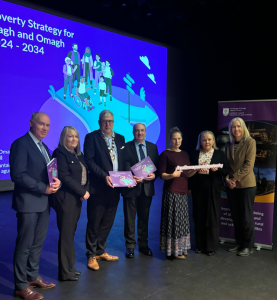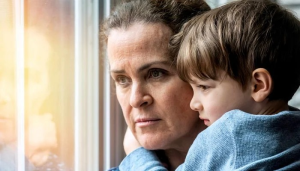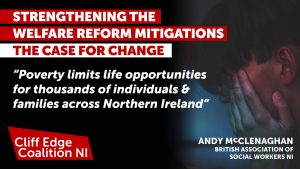The Missing Priority: A Commitment to Address and Eradicate Child Poverty to ensure Children can flourish in Education
4 November 2024
By Dr. Ciara Fitzpatrick
The following is an excerpt from “A response to the Northern Ireland Programme for Government 2024 – 2027: An updated perspective on the Cuts to Education and the Consequences for Children and Young People in Northern Ireland.” This collective response was submitted by ten academics, led by Prof. Noel Purdy, who specialise in education, children and young people, and poverty.
The PfG consultation states that ‘we are working tirelessly to tackle inequalities and make sure that everyone has the best possible opportunity to succeed in life and can feel at home in our society’ (Draft PfG, p.6). The current evidence suggests that this is not the case. Indeed, ‘A Fair Start’ (2021) emphasises that educational underachievement is brought about because of social-economic disadvantage, which is wider than education alone.
The NI Executive made a legal commitment to ‘adopt a strategy setting out how it proposes to tackle poverty, social exclusion and patterns of deprivation based on objective need’ as part of the St Andrew’s Agreement in 2006. This legal commitment is enshrined in Section 28E of the Northern Ireland Act 1998. In 2015, the High Court found the Executive has not adopted such a strategy, following a Judicial Review brought by the Committee on the Administration of Justice (CAJ). This commitment was revitalised as part of the New Decade, New Approach deal (2020), where it was agreed that a restored Executive would ‘develop and implement’ and anti-poverty strategy.
There was some progress between 2020-2022 with the commission of an Expert Advisory Panel to make recommendations to the Department for Communities and subsequently an ‘Anti-Poverty Co-Design Group’ (APCDG) was formed to advise on the drafting of the anti-poverty strategy. Following a breakdown in communication between DfC officials and the APCDG, it was agreed that some members of the group could independently draft a recommendations paper to inform consideration of a draft strategy (CAJ, 2024). As the cost-of-living crisis hit the people of Northern Ireland, the devolved NI Executive collapsed and work on the Anti-Poverty Strategy grinded to a near standstill. Meanwhile, more of our children have fallen victim to poverty.
Recent statistics and the findings outlined in this report demonstrate that child poverty is increasing. The Department for Communities reported that the percentage of children living in relative poverty in 2022/23 was 24%; compared to 18% in 2021/2022. This represents a ‘statistically significant’ increase. Children living in absolute poverty rose from 15% to 19%. In simple terms it means that 1 in 4 children in NI are in relative poverty. And almost 1 in 5 children are now struggling to have their most basic needs met, such as food, shelter and housing.
This alone merits urgent attention from the NI Executive.
The failure to include poverty as a priority in the draft PfG was put directly to the Deputy First Minister in the chamber who claimed:
‘I welcome the actions we have taken so far: £20 million towards tackling educational underachievement. However, we also felt it was important to have key priorities in the Programme for Government to tackle inequalities where they are most acutely felt. For example, on health inequalities, waiting lists and ill health, we know that far more people on lower incomes have chronic illnesses in their early fifties and have worse health outcomes.’
‘I am standing beside the Communities Minister, and I am sure he has heard your question loud and clear. We have a statutory responsibility and obligation to bring forward the anti-poverty strategy. I know that he is actively working on that, and it will align with some of the key priorities identified in the Programme for Government. We have a determination to ensure that, as the First Minister has indicated, everyone is lifted up by tackling such things as affordable and social housing, waiting lists, support for hard-pressed families with affordable childcare, growing the economy and providing better jobs for people, which are all ways to lift people out of poverty. We need to do that collectively as an Executive.’
This response ignores the fact that poverty is at the root of social inequality; rather the Deputy-First Minister seeks to address the symptoms of poverty. As poverty becomes more acute, the inequality gap widens – We demonstrate that simple fact throughout this response. As outlined by the Expert Advisory Panel (2021) ‘poverty cannot be reduced to negligible levels without addressing inequalities of income and wealth.’ The only meaningful way to respond to this challenge is ‘redistribution’ – ensuring that children are the beneficiaries of direct cash transfers (Gordon, 2018; Atkinson, 2015) To address health inequalities, it fundamental to address the ‘social determinants of health, which speaks to the conditions people are living in; that children are growing up in. Michael Marmot (2020) outlines:
Put simply, if health has stopped improving it is a sign that society has stopped improving. Evidence from around the world shows that health is a good measure of social and economic progress. When a society is flourishing health tends to flourish. When a society has large social and economic inequalities there are large inequalities in health. The health of the population is not just a matter of how well the health service is funded and functions, important as that is: health is closely linked to the conditions in which people are born, grow, live, work and age and inequities in power, money and resources – the social determinants of health.
Investing in strong anti-poverty interventions, particularly for children and young people, will ensure that the next generation can truly flourish.
A lack of cooperation
The Northern Ireland Audit Office found that Departments across Government failed to adequately tackle child poverty due to an overly broad focus and the lack of specific and measurable targets. The Audit Office also expressed concern that accountability mechanisms were not understood by all those responsible for delivery roles. Indeed, the NIAO specifically recognises the negative impact of siloed working on the delivery of the Child Poverty Strategy. Its report said:
‘We heard feedback from many stakeholders, including departmental officials involved in strategic delivery, that departments often did not work together to deliver interventions.’
It is unacceptable that NI Civil Service (NICS) departments have not worked together to deliver effective interventions. Recent evidence provided to the Public Accounts Committee (27 June 2024) shows that the status quo continues in respect of poor interdepartmental relationships. Three senior civil servants (Permanent Secretary Colum Boyle, Emer Morelli and George Sampson) confirmed that an anti-poverty cross-departmental working group was set up in 2020, when the Child Poverty Strategy was subsumed into the wider Anti-Poverty Strategy. It met on a regular basis until the collapse of devolution in 2022 and they had not met for the first five months of the new mandate demonstrating just how slow the wheels of government turn. Minister Lyons confirmed that it has now been set up during evidence with the Communities Committee on 24 October 2024 and that their work would be completed by December 2024. Ultimately, these protracted processes have a devastating impact for children. Making Child Poverty an NI Executive priority would undoubtedly create greater impetus and accountability to ensure effective interventions are resourced and delivered to prevent more children from falling into poverty.
The cost of doing nothing brings considerable cost to not only the taxpayer, but to future generations. The NIAO the price of child poverty to be between £825 million and £1 billion annually. The cost relates to the additional pressure that is being put on public services (health, social services, justice) and unfortunately children who grow up in poverty, are more likely to be in poverty during adulthood, and are more likely to earn less and have a higher risk of unemployment. Therefore, they pay less tax over their lifetime and are more likely to require support from the social security system (NIAO, 2024).
A Focus on Protected Characteristics
Despite the challenges posed by over ten years of austerity implemented by the Central Government (Westminster), there have been year-on-year improvements in educational outcomes at GCSE (or equivalent) and A-level (or equivalent). However, these gains are less obvious for children and young people (CYP) who fall into a section 75 group (the classification under the Northern Ireland Act 1998 which recognises the need to protect against discrimination on the basis of gender, religion, race, sexual orientation, and the needs of looked after children) (NIAO, 2021). Children from the Traveller community, Roma children and children in care have some of the lowest levels of attainment of all equality groups (Burns et al., 2015). As outlined in A Fair Start a ‘whole-school approach to nurture and schools having the scope (and budget) to provide a differentiated curriculum bespoke to their pupils’ specific needs are essential in addressing these inequalities’ (Purdy et al., 2021).
Food Insecurity for Children in Poverty
During school holidays, it is thought that the issue of child hunger is further exacerbated, whereby children are known to experience ‘holiday hunger’, as well as social isolation and boredom, which are thought to potentially intensify the differences in educational attainment (Shinwell et al., 2020). The cut to the ‘Holiday Hunger Scheme’ which provided £27 a fortnight to 96,300 children, as the price of food has increased significantly. A ‘Free School Meals Payment’ was introduced on 26 March 2020 by then Ministers Peter Weir (Education) and Deirdre Hargey (Communities) with cross-party support, which provided direct cash transfers to families with Free School Meal Entitlement (FSME) (DENI, 2020). This scheme has been extended consistently since then, as the COVID-19 pandemic has been followed by an economic crisis which has inflated the cost of everyday essentials, making it difficult for FSME families to afford food. Controversy raged in England during the COVID-19 pandemic as families reported poor food parcel alternatives to FSME (The Guardian, 2021). This led to England and Manchester United footballer Marcus Rashford becoming involved in a national debate with the Government, which eventually led to the introduction of a National Voucher Scheme. In Scotland and Wales there was a patchwork of provision (cash transfer, vouchers, food parcels) dependent on Local Authorities resources (McIntyre et al, 2022). Meanwhile, NI arguably led the way by implementing a NI wide cash-first approach which provided families with the dignity of choice and control (Patrick et al, 2021).
Research by Spyreli et al. (2021) underlined that the FSME payment scheme in conjunction with the accessibility of food aid lessened families’ expenditure and considerably contributed towards their food security during the pandemic. Removal of the Holiday Hunger Scheme will put increasing pressure on a charitable sector which is unsustainable (The Trussell Trust, 2023). The most recent figures from The Trussell Trust in NI (51 foodbanks) show that the organisation distributed over 90,300 emergency food parcels in 2023/24 – the highest number of parcels that the network in NI has ever distributed and represents an 11% increase on 2022/23 levels. This is a higher increase that the respective figures for England (5%), Scotland (-0.1%), and Wales (1%). Over 38,000 parcels were provided for children in this period. These figures represent more than a doubling (143% increase) in the number of parcels distributed five years ago in 2018/19 and they are far above the levels seen before the rapid increases in the cost of living in 2021/22 (62,600 parcels). This growth in need is higher for children, with the number of parcels provided for them increasing by 151% over the five-year period between 2018/19 and 2023/24. The Resolution Foundation found that food made up 15% of total spending for the lowest income households in 2019-20, compared to 10% for the highest earning households, this was before inflation started to bite. A coping strategy for low-income households is to seek cheaper alternatives often from the discounted food shelves. However, if households are already buying own-brand alternatives and discount food there’s a limited chance to find cheaper alternatives. As recent research on the experiences of Women in NI during the Cost-of-Living Crisis found, increasing prices coupled with lack of affordable foods has led to mothers skipping meals, resorting to cheaper processed foods and eating out-of-date food (Harding et al., 2023).
New research published by the Covid Social Mobility and Opportunities (COSMO) study (based at London School of Economics), which is following 13,000 young people, provides compelling evidence of the impact of food insecurity on educational attainment. Pupils in families who reported using foodbanks during the pandemic received lower GCSE grades (almost half a grade per subject), even taking into account past grades and other features of their household finances, with long-term disadvantage being a more significant factor than the pandemic. The same study also shows that rates of psychological distress were substantially higher in households who started using foodbanks during the pandemic (53% among young people and 63% among parents) (Cullinane et al., 2023). This vividly demonstrates the long-term impact of food insecurity on both educational attainment and on mental health, which supports Spyreli et al’s (2021) conclusion that further food related support is needed to mitigate the increased risks of food insecurity for economically disadvantaged children. It is crucial that the Holiday Hunger Scheme is reinstated as increasing food insecurity will lead to better educational outcomes. It is also important that Labour’s Breakfast Club initiative is extended to schools in Northern Ireland.
The Education Gap following the COVID-19 Pandemic
The Engage Programme was a targeted intervention developed by the DENI to ‘limit any longterm adverse impact of the COVID-19 lockdown on educational standards by supporting pupils’ learning and engagement on their return to school/setting through provision of high quality one to one, small group or team-teaching support in every school/setting in Northern Ireland’ (DENI, 2023a). The approach went some way to implementing ‘tailored approaches to teaching and learning’ outlined in ‘A Fair Start’ (DENI, 2021). The Engage Programme was due to continue into a third year at the same level of provision before it was cut at the end of March 2023. Horgan et al. (2020) report that over 970 primary and post-primary schools’ benefits from Engage funding, with approximately 443 primary and post-primary schools with above average levels of FSM entitlement (27% of pupils) being provided with a higher level of funding to support additional teachers and substitute teachers during the 2022/23 year to support pupils to engage with learning. DENI outline that the impact of COVID-19 was felt disproportionately across s.75 groups, thus the end of the Engage Programme ‘will have a negative impact on all school aged children who would have been targeted with Engage support, alongside their families’ (DENI, 2023a). This will be further explored below, with respect to the disproportional impact on minority ethnic CYP.
School Uniform Costs
Financial hardship will be further compounded by the pressure of school uniform costs. The current school uniform grant in NI is significantly less than those in other parts of the UK (e.g., it is £42.90 per primary school child age pupil compared to £120 in Scotland). This is despite the Minister for Education announcing a 20% rise in the school uniform grant last summer (DENI, 2022). There are no uniform grants available for nursery age children. The ‘Parent Engagement Group’ (PEG, 2021) which campaigns for school uniform reform in NI has voiced concern about the cost of branded items and the lack of choice in respect of suppliers. The group also reported that the average cost of a primary school uniform in NI was £173 and post primary £378 (PEG, 2021). Such costs are undoubtedly challenging for children coming from disadvantaged backgrounds, particularly in households with multiple school aged children. The failure of government to review the school uniform grant coupled with the Cost-of-Living Crisis has led to schools and community organisations setting up ‘uniform swaps shops’ to support local families, which relies on parents and/or teachers and local volunteers to organise, sort and distribute. An increased reliance on charitable provision can increase the stigma that parents and children feel, exacerbating feelings of social exclusion. Furthermore, research from The Children’s Society (2020) estimates that half a million children in the UK have been sent home from school due to having incorrect uniform.
Period Products
DENI also confirmed that it would cut its funding to support Free Period Products by 40% (from £413,786 to £243,000) for 2023/24 undermining the intention of the Period Products (Free Provision) Act (Northern Ireland) 2022. Again, in research by Harding et al. (2023), sanitary products were found to be a source of financial strain for households, particularly where there were young people who needed access to them. Indeed, in moving the Bill, Pat Catney MLA then quoted Council for the Curriculum, Examinations and Assessment (CCEA) period poverty survey statistics which showed 53% of pupils who menstruate felt embarrassed buying period products, while 56% had to ask to borrow from a friend or teacher. Less funding means that less support will be available and represents a retrograde step in the movement towards providing free universal access to tampons, pads and reusable options (Period Products (Free Provision Bill) 2021).
Conclusions
In conclusion, the evidence presented strongly denotes the consequences that the current cuts to education will have on our most disadvantaged children. The schemes which have been removed sought to reduce inequalities and educational underachievement for our young citizens. If we do not urgently invest in education to alleviate the experience of being in poverty and to reduce the cost of the school day, we risk putting up further socio-economic barriers which will increase educational underachievement. The existing barriers have been heightened by simultaneous public crises and are becoming insurmountable for our CYP to climb.
jacktoto slot gacor situs toto toto slot situs togel toto slot situs toto toto slot situs togel rtp







